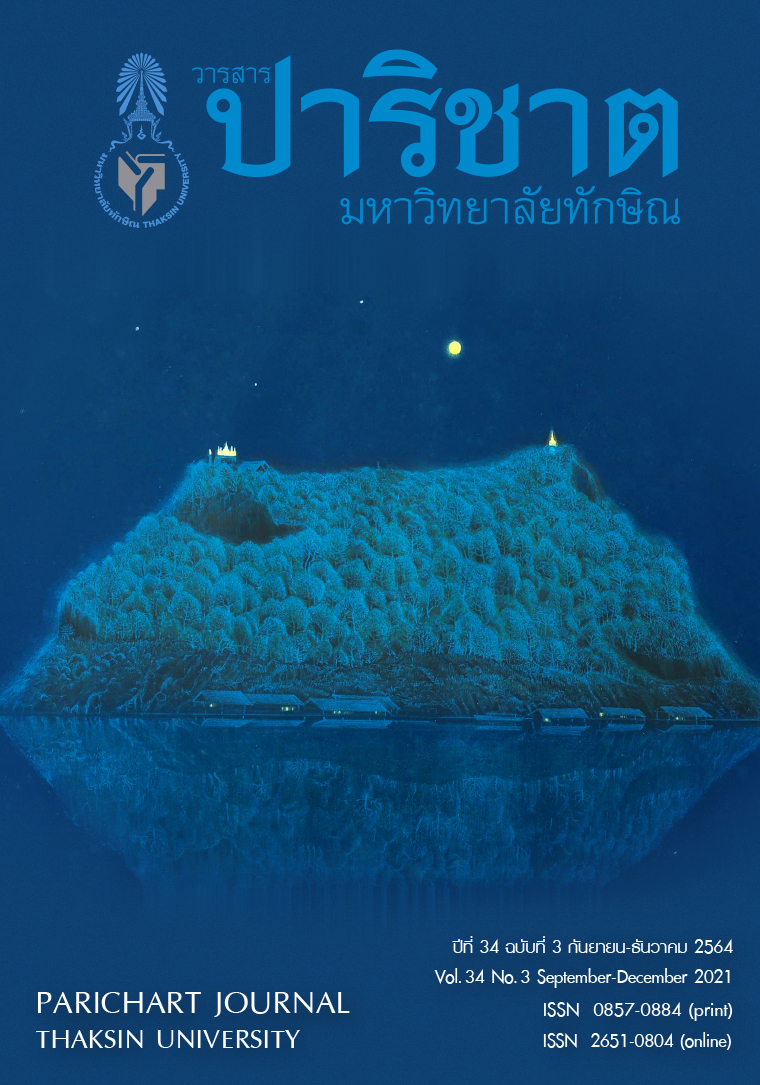The Correlation between English Learning Experience and L2 Motivational Self-system in a Thai EFL Context
Main Article Content
Abstract
This research article is an investigation into correlations between a) the L2 Motivational Self System (ideal self/ought-to L2 self) and contextual elements and b) what factor has the greatest influence on learning effort intentions. Using purposive sampling, the researcher selected 400 students out of a student cohort of 10,163. All participants were volunteers for this quantitative research initiative; there were 124 males (31.0%) and 276 females (69.0%). Every participant was a first-year student, drawn from a number of faculties in state university in north-east Thailand; every student had enrolled on the English foundation course. The harvested data underwent structural equation modelling analysis (SEM) and confirmatory factor analysis (CFA). The results of the research found that there was a correlation between a) the ideal self and learning effort intentions (r = 0.58) and b) the ought-to L2 self and learning effort intentions (r = 0.472). Furthermore, it was demonstrated that learning attitude is the most significant influence on learning effort intention.
Article Details
References
Bunnag, S. (2005). English skills lowly ranked: Tests put Thais near bottom in S.E. Asia. Bangkok Post (10 August 2005): 5.
Prapphal, K., & Opanon-Amata, P. (2002). An investigation of English proficiency of Thai graduates. Research Report. Chulavijai, 21(3), 12-16.
Polrak, M. (2019). Factors causing demotivation in English learning among Thai student [sic] in the Faculty of Agricultural Technology, Kmitl. The 10th Hatyai National and International Conference. 1807-1819.
Williams, M., & Burden, R. (1997). Psychology for language teachers. Cambridge, UK: Cambridge University Press.
Jung, S. K. (2011). Demotivating and remotivating factors in learning English: A case of low-level college students. English Teaching, (66)2, 47-72.
Motivation. (2014). In Oxford Online Dictionary. Retrieved from: http://www.oxforddictionaries.com/definition/english/motivation?q=motivation. (2020, August 15)
Hadfield, J., & Dörnyei, Z. (2013). Motivating learning: Research and resources in language teaching. Harlow, UK: Pearson.
Geringer, J. (2003). Reflections on professional development: Toward high-quality teaching and learning. Phi Delta Kappan, 84(5), 373-380.
Noopong, D. (2002). English teaching problems and the needs for professional development of teachers of English in education extended schools under the jurisdiction of the Office of Primary Education, Nakhon Ratchasima. Nakhon Ratchasima Rajabhat University. English Program.
Dhanasobhon, S. (2006). English language teaching dilemma in Thailand. Retrieved from http://www.curriculumandinstruction.org/index.php?lay=show&ac=article&Id=539134523&Ntype=7. (2020, August 15)
Dörnyei, Z. (2009). The L2 motivational self-system. Motivation, language identity, and the L2 self. Harlow, UK: Pearson.
Gardner, R. C., & Lambert, W. E. (1972). Attitudes and motivation in second language learning. Rowley, Massachusetts: Newbury House Publishers.
Yamane T. (1973). Statistics: An Introductory Analysis (3rd ed.). New York: Harper & Row Publications.
Maslow, A. H. (1970). Motivation and Personality. New York: Harper & Row Publishers.
Gardner, R. C. (2010). Motivation and Second Language Acquisition: The Socio-Educational Model. New York: Peter Lang.
Magid, M., & Chan, L. (2012). Motivating English learners by helping them visualize their ideal L2 self: Lessons from two motivational Programs. Innovation in Language Learning and Teaching, 1-13.
Ueki, M., & Takeuchi, O. (2012). Validating the L2 motivational self-system in a Japanese EFL context: The interplay of L2 motivation, L2 anxiety, and the perceived amount of information. Language Education & Technology, Modern Language Journal, 49(2012), 1-22.
Asgari, A. (2010). The influence of informal language learning environment (parents and home environment) on the vocabulary learning strategies. English Language and Literature Studies, 1(1), 7-13.
Atta, M., & Jamil, A. (2012). Effects of motivation and parental influence on the educational attainments of students at secondary level. Academic Research International, 2(3), 427-431.
Wharton, G. (2000). Language learning strategy use of bilingual foreign language Learners in Singapore. Language Learning, 50(2), 203-243.
Yang, N. D. (1999). The relationship between EFL learners’ beliefs and learning strategy Use. System, 27(4), 459-472.
By, H., & Laohawiriyanon, C. (2019). The L2 motivational self system of low and high achievers in a Cambodian Context. Journal of Language Teaching and Learning in Thailand, 57(2019), 67-100.
Nguyen D. T. T., & Foley, J. A. (2019). Exploring Vietnamese students’ degree of motivation in learning English through enhancing their ideal L2 self. The 15th International Conference on Humanities and Social Science. Khoen Kaen, Thailand: Khon Kaen University.
Darling, W. E., & Chanyoo, N. (2018). Relationships of L2 motivational self-system components and willingness to communicate in English among Thai Undergraduate Students. NIDA Journal of Language and Communication, 23(33), 1-22.


